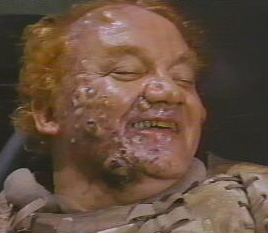I’ve been participating in a discussion board on the topic of what makes an LGBT portrayal good or bad.
The question was posed by an LGBT writer and got several of us sharing our favorite characters. But the discussion soon drew in non-LGBT writers who were worried about their own depictions and not wanting to offend.
There’s a history of villainizing gay men in lit, playing to a conscious or subconscious fear of effeminacy and our “strange” proclivities. Likely, this trend was a lot more prevalent prior to the civil rights movement. Think about the many fey villains in Ian Fleming’s James Bond series, their apathy toward women the perfect foil to Bond’s rather active heterosexuality. Or—from Frank Herbert’s Dune—the gluttonous, deranged Baron Vladimir Harkonnen who can barely keep a handle on his lust for his young nephews.

Another popular trope is sometimes called ‘Bury your Gays.’ How many LGBT’s in mainstream novels make it to the end of the story alive? (especially if they are non-gender conforming and/or open about their sexuality?). Somehow, gay tragic heroes bother me more than gay villains. Jack Twist in Annie Proulx’s Brokeback Mountain, for example. Practically all the “classics” have LGBT’s killing themselves or at least ending off badly: James Baldwin’s Giovanni’s Room, Radclyffe Hall’s The Well of Loneliness, D.H. Lawrence’s The Fox, among others.
Representations have certainly gotten better, but if you believe in the concept of a collective unconscious—as I do—archetypes never really die, they go through derivations, softening perhaps, but persisting as something we believe to be true about the world.
I notice this is some of the historical fiction I read: Turnus, the petulant prince-suitor who is mocked for his homosexual-leanings, in Ursula LeGuin’s Lavinia. Ay, the ruthless puppet-master behind ancient Egypt’s dynastic political workings, in Nick Drake’s Nefertiti. (He’s mentioned to be gay for no apparent reason other than to set him apart as the only gay character in the novel).
In some recent stories, LGBT villains have become less evil and more absurd. I haven’t seen the movie, but there’s quite a fracas over the glam rock-inspired bad guy in the new Tron: Legacy. You can check the discussion out on AfterElton.
I know I’m veering away from literary examples (which elude me now), but there’s Dr. Evil from Mike Myers’ Austin Powers’ films and scores of queeny villains in TV’s South Park and you bet you’ll find at least a couple ridiculous or tragic (or ridiculous AND tragic) LGBT’s in any Wayans Brothers film.
I don’t think any of these depictions are horrible or bent on destroying the LGBT community (some of them are clever and funny), but I do think they’re worth examining. And the best kind of LGBT portrayal—in my mind—is one that turns the tropes on their heads, re-imagining what we think we know. Can a gay teen save the world, as in Perry Moore’s Hero? Have the lives of our folktale villains been suppressed and misunderstood, as in Douglas Clegg’s Mordred, Bastard Son? This is the stuff I want to read.
